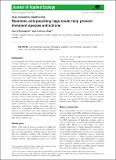Real-time anti-poaching tags could help prevent imminent species extinctions
Abstract
At an estimated $7–10 billion annually, the global trade in illegal wildlife parts is comparable in economic value to human trafficking, and the smuggling of weapons and drugs (Wasser et al. 2008; Wyler & Sheikh 2013). Basic economic principles of supply and demand ensure that, as target species become ever rarer, their market value continues to rise, gradually pushing them towards extinction (Courchamp et al. 2006; Nowell 2012a). One particular problem is that anti-poaching rangers often arrive too late at crime scenes to arrest criminals, making poaching a low-risk and high-gains enterprise (Wyler & Sheikh 2013). Here, we identify an opportunity to address this fundamental problem – we propose that cutting-edge tracking technology could be harnessed to implement effective ‘real-time poaching-alert systems’. Animals would be fitted with miniature electronic devices (‘biologgers’) that can detect a poaching event, establish its exact location, and relay data remotely to ground teams. Such systems should considerably increase the chances of successful interception, and thereby, escalate the actual and perceived risks of poaching, establishing a powerful new deterrent. In combination with other mitigation strategies (reviewed below), this innovative approach could lead to a much-needed breakthrough in the increasingly desperate fight against wildlife crime.
Citation
O’Donoghue , P & Rutz , C 2016 , ' Real-time anti-poaching tags could help prevent imminent species extinctions ' , Journal of Applied Ecology , vol. 53 , no. 1 , pp. 5-10 . https://doi.org/10.1111/1365-2664.12452
Publication
Journal of Applied Ecology
Status
Peer reviewed
ISSN
0021-8901Type
Journal article
Description
This research was funder by Biotechnology and Biological Sciences Research Council - Grant Number: BB/G023913/2.Collections
Items in the St Andrews Research Repository are protected by copyright, with all rights reserved, unless otherwise indicated.

